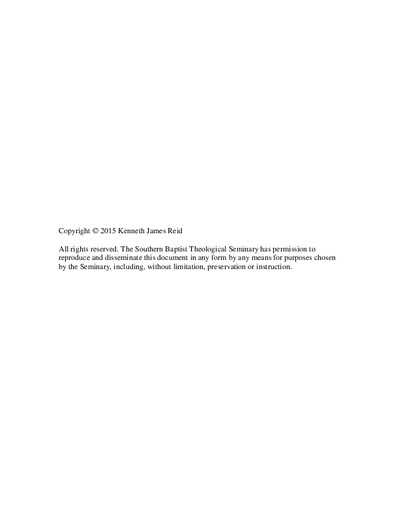Penal Substitutionary Atonement as the Basis for New Covenant and New Creation
Subject
AtonementCovenant theology
Abstract
This study will demonstrate that penal substitutionary atonement is necessary for the new creation. The new covenant promises are inaugurated at Jesus’ death and at Pentecost when the Spirit indwells Christians; the promises are consummated in the new heavens and the new earth. Jesus says that his death inaugurates the new covenant at the Last Supper (Luke 22:14-20). This study will argue that the new covenant promises of forgiveness, transformation by the Spirit, God’s abiding presence, and the believer’s knowledge of God require penal substitutionary atonement.
Chapter 1 recounts the critique that penal substitution cannot account for transformation and the new creation. The chapter sets up the thesis and methodology of this study, and the rationale of a new covenant approach. Various critiques against penal substitution are also explored.
Chapters 2 and 3 serve as foundational chapters in three respects. Chapter 2 presents a defense of penal substitutionary atonement by examining key passages in the Old and New Testaments. Chapter 3 explores the meaning of covenant and enumerates new covenant promises. In addition, the nature of the new covenant is explored by surveying relevant New Testament passages. Finally, the chapter shows that atonement inaugurates the new covenant.
Chapters 4-7 each argue that penal substitution is required to fulfill the promises for personal renewal: the forgiveness of sins, the transformation of the heart by the Holy Spirit, God’s everlasting covenant presence, and an intimate knowledge of God by all covenant members. Each promise of the new covenant provides forgiveness of sins, enables empowerment over sin, or overcomes sin’s effects that form a barrier to a relationship with God.
Chapter 8 argues that reconciliation requires penal substitutionary atonement, and reconciliation is the ultimate goal of the new covenant; God’ restores his relationship with his people so that he dwells with them in the new created order. Chapter 9 concludes with the affirmation that penal substitutionary atonement is necessary for the new created order, and it explores implications and areas of further study.

